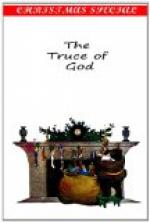“Yes!” cried the monarch-elect, seizing his wrist, “the gratification of my ambition!”
Gilbert started at the trembling tones and excited gesture of his companion.
“Gilbert,” continued the duke, regaining his composure, “you see me in possession of all that I ever craved on earth. I am now legally invested with the imperial crown. It was not the peaceable enjoyment of the throne I asked, but permission to occupy it. I am gratified. With all my hopes realized—I never was more miserable than at this moment. I am not sad because I feel that my career is drawing to a close—that I shall be unsuccessful in the struggle for undisputed power: it is sufficient for me that I die a king. I tremble because I have discovered the impotence of earthly things to gratify the cravings of an immortal soul—because, in finding that I have a capacity of enjoyment not to be appeased by the highest dignities on earth, I begin to comprehend my immortality. I see what a shadow I have pursued—how madly I have neglected eternal happiness for temporal preferment. You, my son, are full of earthly hope, dreaming of the Lady Margaret, of minstrels’ praises, and knightly fame. Do not think me harsh, if I pray God that you may speedily know their emptiness. You can never rise as high in this mundane atmosphere as I am now; but your soul is as immortal as mine, and would sicken over less renown, as I do over this.”
Rodolph paused, and Gilbert, struck dumb with surprise, gazed up into his face.
“It is late, my son,” he resumed, “and we must part. Is there anything you would ask before leaving me?”
“There is to be a tournament to-morrow,” the youth faltered out.
“And you would take part, in spite of my discourse,” said the duke, with a smile.
Gilbert’s reddening cheeks answered for him.
“I must forbid you to couch lance to-morrow,” said Rodolph, tenderly; “you shall receive your spurs at my hands when I am king, but let me be the judge of the time. And remember, my son,” he added, detaining Gilbert as the latter was about to retire, “remember what you have seen this night. When men shall question my motives, and extol or condemn me, you may say that Rodolph of Suabia was inspired by ambition to seek the crown, but that when it was within his grasp, he would have turned from it in disgust, had not conscience and patriotism compelled him to wear it.”
As Gilbert, deeply moved, kissed his hand and withdrew, Rodolph retired to an oratory into which his apartments opened. He had been there engaged in prayer for more than an hour, when the Archbishop of Mayence appeared, and, after a brief adoration, entered the confessional. There, in the silent hour of midnight, the king knelt before the priest, in obedience to the voice of that God who bequeathed us a Church to administer the Sacraments which He appointed for our salvation, and through which we can only attain it. When Rodolph sat again in his chamber, his brow was calmer and his eye softer and brighter.




